
Sukkot, commonly called the Feast of Tabernacles or in some translations the Festival of Shelters, and known also as the Feast of Ingathering, is a biblical Jewish holiday celebrated on the 15th day of the seventh month, Tishrei. During the existence of the Jerusalem Temple, it was one of the Three Pilgrimage Festivals on which the Israelites were commanded to perform a pilgrimage to the Temple.
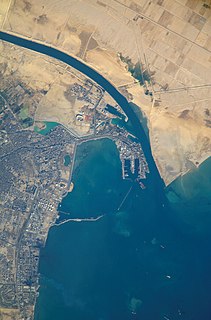
The Suez Canal redirects here, for other uses see 2021 Suez Canal obstruction

The Six-Day War, also known as the June War, 1967 Arab–Israeli War, or Third Arab–Israeli War, was fought between 5 and 10 June 1967 between Israel and Jordan, Syria, and Egypt.
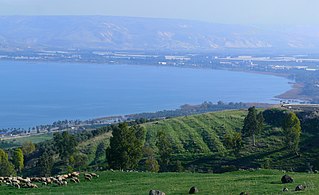
The Sea of Galilee, also called Lake Tiberias, Kinneret or Kinnereth, is a freshwater lake in Israel. It is the lowest freshwater lake on Earth and the second-lowest lake in the world, at levels between 215 metres (705 ft) and 209 metres (686 ft) below sea level. It is approximately 53 km (33 mi) in circumference, about 21 km (13 mi) long, and 13 km (8.1 mi) wide. Its area is 166.7 km2 (64.4 sq mi) at its fullest, and its maximum depth is approximately 43 metres (141 ft). The lake is fed partly by underground springs but its main source is the Jordan River, which flows through it from north to south and exits the lake at the Degania Dam.
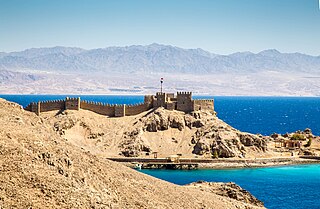
Taba is an Egyptian town near the northern tip of the Gulf of Aqaba. Taba is the location of Egypt's busiest border crossing with neighbouring Eilat, Israel. Taba is a frequent vacation spot for Egyptians and tourists, especially those from Israel on their way to other destinations in Egypt or as a weekend getaway. It is the northernmost resort of Egypt's Red Sea Riviera.

The sand cat, also known as the sand dune cat, is a small wild cat that inhabits sandy and stony deserts far from water sources. With its sandy to light grey fur, it is well camouflaged in a desert environment. Its head-and-body length ranges from 39–52 cm (15–20 in) with a 23–31 cm (9.1–12.2 in) long tail. Its 5–7 cm (2.0–2.8 in) long ears are set low on the sides of the head, aiding detection of prey moving underground. The long hair covering the soles of its feet insulates its foot pads against the extremely hot and cold temperatures in deserts.

The Arabah, or Arava / Aravah, as it is known by its respective Arabic and Hebrew names, is a geographic area south of the Dead Sea basin, which forms part of the border between Israel to the west and Jordan to the east.

Ein Gedi, literally "spring of the kid " is an oasis and a nature reserve in Israel, located west of the Dead Sea, near Masada and the Qumran Caves. Ein Gedi was listed in 2016 as one of the most popular nature sites in the country. The site attracts about one million visitors a year.
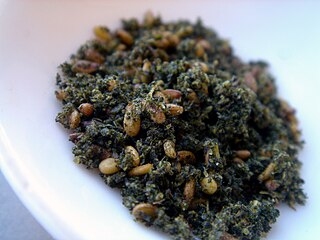
Za'atar is a culinary herb or family of herbs. It is also the name of a spice mixture that includes the herb along with toasted sesame seeds, dried sumac, often salt, as well as other spices. As a family of related Middle Eastern herbs, it contains plants from the genera Origanum (oregano), Calamintha, Thymus, and Satureja (savory) plants. The name za'atar alone most properly applies to Origanum syriacum, considered in biblical scholarship to be the hyssop of the Hebrew Bible. Used in Levantine cuisine, both the herb and spice mixture are popular throughout the Mediterranean region of the Middle East.

The mountain gazelle or the Palestine mountain gazelle is a species of gazelle widely but unevenly distributed.

Blanford's fox is a small fox native to the Middle East and Central Asia. It is listed as Least Concern on the IUCN Red List.
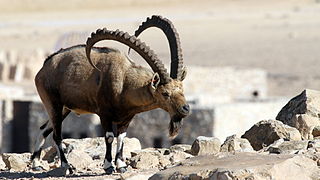
The Nubian ibex is a desert-dwelling goat species found in mountainous areas of northern and northeast Africa, and the Middle East. It was historically considered to be a subspecies of the Alpine ibex, but is now considered a distinct species. The wild population is estimated at 1,200 individuals.
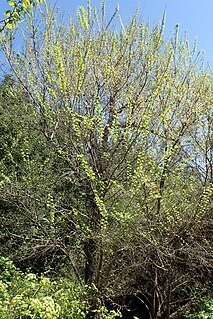
Ulmus minorsubsp.canescens is a small deciduous tree occasionally known by the common names grey elm, grey-leafed elm, and hoary elm. Its natural range extends through the lands of the central and eastern Mediterranean, from southern Italy, the islands of Sicily, Malta, Crete, Rhodes and Cyprus, to Turkey, and as far south as Israel, where it is now considered rare and endangered in the wild. The tree is typically found amidst the comparatively humid coastal woodlands and scrublands.

Israel, officially known as the State of Israel, is a country in Western Asia, located on the southeastern shore of the Mediterranean Sea and the northern shore of the Red Sea. It has land borders with Lebanon to the north, Syria to the northeast, Jordan on the east, the Palestinian territories of the West Bank and the Gaza Strip to the east and west, respectively, and Egypt to the southwest. Israel's economic and technological center is Tel Aviv, while its seat of government and proclaimed capital is Jerusalem, although international recognition of the state's sovereignty over Jerusalem is limited.
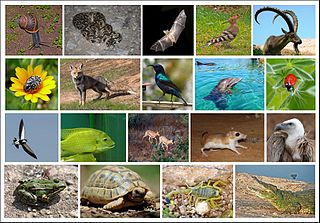
The wildlife of Israel includes the flora and fauna of Israel, which is extremely diverse due to the country's location between the temperate and the tropical zones, bordering the Mediterranean Sea in the west and the desert in the east. Species such as the Syrian brown bear and the Arabian ostrich have become extinct in Israel because of their loss of habitat. As of May 2007, 190 nature reserves have been established in Israel.

Günther's vole is a species of rodent in the family Cricetidae, also known by the name Levant vole. It is found in Bulgaria, Greece, Iran, Iraq, Israel, Jordan, Lebanon, North Macedonia, Serbia and Montenegro, Syria, Turkey, and Libya. In Libya, its natural habitats are temperate grassland, subtropical or tropical high-altitude grassland, and arable land. In Israel, it is common in lowland agricultural fields, in peak years becoming a major crop pest.

The bushy-tailed jird or bushy-tailed dipodil is a species of rodent in the family Muridae. It is the only species in the genus Sekeetamys. It is found in Egypt, Israel, Jordan, Saudi Arabia, and Sudan. Its natural habitat is rocky areas.

National parks of Israel are declared historic sites or nature reserves, which are mostly operated and maintained by the National Nature and Parks Authority. As of 2015, Israel maintains 81 national parks and more than 400 nature reserves, many of them in the occupied West Bank, that protect 2,500 species of indigenous wild plants, 32 species of fish, 530 species of birds and 100 species of mammals.

The Persian fallow deer is a rare deer native to the Middle East, today occurring only in Iran and Israel by being reintroduced into the wild. It has been listed as endangered on the IUCN Red List since 2008. After a captive breeding program, the population has rebounded from only a handful of deer in the 1960s to over a thousand individuals today.

Katinka's shrew is a species of mammal in the family Soricidae. It has been recorded from Israel, Syria, and Palestine, but it may now be extinct in Israel. It may also be present in southwestern Iran.



















